By Maxmilian Wechsler
| IN recent years Westerners, mostly male, have been stopped and searched and even commanded to get out of cabs by uniformed police in areas of central Bangkok. City police are well known for routine shakedowns of motorists over minor traffic violations to supplement their low incomes, but longtime residents say that up until about five years ago targeting foreigners, especially Westerners, was virtually unheard of. This is particularly true with regard to intimidating practices like public searches. |
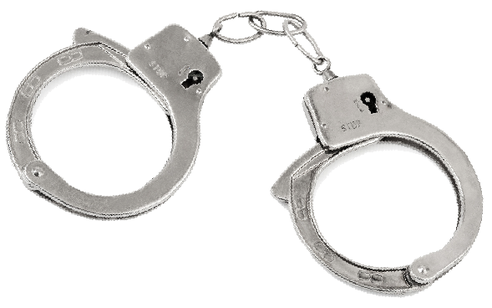
But in 2014 these incidents reached an all-time high and reports of harassment were widely circulated in local media, and in foreign media like the Wall Street Journal. It was also a subject of much interest in social media and travel websites.
The searches, mostly in areas under the jurisdiction of Thonglor, Lumpini and Bangrak police districts, were a cause of embarrassment and sometimes outright fear for foreign tourists and longtime residents alike. In Thailand, as in most countries, police are still required to have probable cause before they can stop people on the street.
That didn’t prevent a few rogue officers from picking out passing foreigners, apparently at random, and demanding that they show identification and empty their pockets. Purses, backpacks and shopping bags were inspected and sometimes “suspects” were frisked. On some occasions foreigners were told to provide a urine sample and led, for example, to a gas station toilet.
In some cases, but not all, the motivation for the searches appears to have been monetary, as some foreigners reported that producing cash brought an abrupt end to their ordeals. It is impossible to know how many illegal searches were carried out, but those reported in the media are probably just a small fraction.
The searches peaked in the second half of last year and then decreased dramatically in 2015. This may reflect complaints from British Ambassador to Thailand, Mark Kent, to Ministry of Tourism and Sports officials in December. Shortly after the ambassador’s intervention, then Police Lieutenant General, Prawut Thawonsiri, and spokesman for the Royal Thai Police, promised that all reports of tourists being harassed would be investigated, and if substantiated there would be further investigation to determine if active police were involved.
The searches, mostly in areas under the jurisdiction of Thonglor, Lumpini and Bangrak police districts, were a cause of embarrassment and sometimes outright fear for foreign tourists and longtime residents alike. In Thailand, as in most countries, police are still required to have probable cause before they can stop people on the street.
That didn’t prevent a few rogue officers from picking out passing foreigners, apparently at random, and demanding that they show identification and empty their pockets. Purses, backpacks and shopping bags were inspected and sometimes “suspects” were frisked. On some occasions foreigners were told to provide a urine sample and led, for example, to a gas station toilet.
In some cases, but not all, the motivation for the searches appears to have been monetary, as some foreigners reported that producing cash brought an abrupt end to their ordeals. It is impossible to know how many illegal searches were carried out, but those reported in the media are probably just a small fraction.
The searches peaked in the second half of last year and then decreased dramatically in 2015. This may reflect complaints from British Ambassador to Thailand, Mark Kent, to Ministry of Tourism and Sports officials in December. Shortly after the ambassador’s intervention, then Police Lieutenant General, Prawut Thawonsiri, and spokesman for the Royal Thai Police, promised that all reports of tourists being harassed would be investigated, and if substantiated there would be further investigation to determine if active police were involved.
| Not surprisingly, the chief of Thonglor police station, Colonel Khajohnpong Jitpakpoom, was replaced in January 2015, but in late December Thonglor police distributed a leaflet listing the rights of those subjected to police searches. The leaflet reads: “Foreign may take photos of police officers who do the search before searching begins. Searching has to be done in a place with sufficient lighting and not be desolate. Collecting a urine specimen must be done only at the police station.” At the top of the leaflet in bold print are the words, “Thonglor Police Station Notice about Searching foreigners for contraband.” This was the first time any reason was given for the searches. A general definition of contraband is anything prohibited by law from being imported or exported. Yet it’s no secret that Thonglor district is swamped with vendors selling illegally imported items such as sex toys, counterfeit erectile dysfunctional medications and banned drugs. The vendors, some from neighbouring countries, operate with impunity along Sukhumvit and are plainly visible near the Asoke intersection where many of the reported searches took place. The vendors’ pavement stands are in violation of a myriad of laws, but they seem to be beyond the notice of both local police and uniformed inspectors of the Bangkok Metropolitan Administration (BMA). The BMA inspectors, also called thetsakij, are also charged with regulating retail stands on Bangkok footpaths. The thetsakij are also sometimes referred to as “Cigarette Police” after a notorious longstanding scam in different Bangkok municipalities in which foreigners, including Westerners and Japanese, South Korean and Middle Eastern nationals, were confronted after allegedly dropping a cigarette butt, piece of paper or other debris on the footpath. The fine was usually 2,000 baht and it had to be paid immediately at a BMA booth or desk on the footpath. Thai people were never bothered, even though vendors commonly set out rubbish and food waste right on the footpaths. It was also reported on many occasions that BMA inspectors rarely issue a receipt after collecting a fine. There have also been reports of thetsakij extorting money from foreigners who thought they were police. Allegedly some inspectors claim to be police and they do have similar (brown or grey) uniforms, but there is absolutely no connection. | Interview with a high-ranking policeman A Police Lieutenant Colonel who requested anonymity told The BigChilli: “According to Section 93 of the Criminal Procedure Code, no search may be made on any person in a public place, unless it is made by an administrative or police official when there are reasonable grounds for suspecting that such person has in his possession an article for the commission of an offence, or obtained through an offence or the possession of which is an offence.” Asked if a police officer is empowered to stop a foreigner on the street and ask to see a passport, or any other identification, without a reasonable suspicion that said foreigner might be involved in a criminal activity, he answered, “Absolutely not, according to Section 93. “In my opinion,” continued the officer, “all searches of foreigners conducted on the street are illegal. However, any police officer can justify a search to their superiors by saying that the foreigner ‘behaved suspiciously,’ and someone can be branded as suspicious for reasons like walking slowly, walking fast, running, looking behind or looking around! Moreover, any person carrying a bag or luggage can be also be fair game for a search because the police can say they may be concealing a bomb, narcotics or fake passports. “When a foreigner, especially a tourist, is surrounded by policemen, it is definitely a frightening experience. It is best to comply with the directions given by the police. However, if they demand a urine sample on the street, the person should refuse. According to Section 93, this can only be done at a police station. “Police who search a foreigner on the street must present evidence in their report to their superior to explain why this was done. If there’s no justification for the search the policeman should be punished by the superior,” the officer said. He added that some police personally dislike foreigners and may single them out to show they have power over them. In such cases the policeman probably won’t ask for money. It must be said that even at the height of this reprehensible practice only a very small percentage of Bangkok police officers were involved, which can’t be said about the BMA uniformed inspectors. Nevertheless, they did great damage to the reputation of the whole force. |

Uniformed society: A Who’s Who Guide
Our police source pointed out that Thais generally respect uniforms and the people wearing them. Besides police, uniforms are also worn by government schoolteachers, expressway toll collectors, postmen, electricity and waterworks staff, prison guards and many employees in government agencies and state enterprises. In fact, all civil servants have to wear a uniform on Monday.
“People wearing a uniform sometimes feel important and powerful. They may think it gives them authority over other people, including foreigners, and behave accordingly. In Thailand we also have private security guards belonging to hundreds of companies wearing uniforms that often resemble those of the police or military. This could be confusing to foreigners, especially tourists, when they are approached by them in car parks or other public places.”
Our police source pointed out that Thais generally respect uniforms and the people wearing them. Besides police, uniforms are also worn by government schoolteachers, expressway toll collectors, postmen, electricity and waterworks staff, prison guards and many employees in government agencies and state enterprises. In fact, all civil servants have to wear a uniform on Monday.
“People wearing a uniform sometimes feel important and powerful. They may think it gives them authority over other people, including foreigners, and behave accordingly. In Thailand we also have private security guards belonging to hundreds of companies wearing uniforms that often resemble those of the police or military. This could be confusing to foreigners, especially tourists, when they are approached by them in car parks or other public places.”
| The officer gave some tips for foreigners who can’t read Thai to identify police officers in case they have a problem. “You can distinguish which police division an officer is attached to by the patches or tabs on the arm or shoulder – Crime Suppression Division, Immigration, Tourist Police, Special Branch, Commando, Narcotic Suppression Police and so on. Some of the patches have English writing,” the policeman said. “For foreigners, taking notice of the helmets may help in identifying uniformed policemen. For example, gold helmets represent patrol officers attached to the local police station. They patrol in pairs on a single motorcycle in the area under their jurisdiction. Those wearing a white helmet with a red stripe are traffic police attached to the local police station. “Traffic police directing traffic at intersections have a white armband with the name of province on the right sleeve. A white helmet with an orange stripe means the officer is attached to the Traffic Police Division (TPD) of the Metropolitan Police Bureau (MPB). Every helmet, no matter what colour, must have a number printed on it which can be used to identify the policeman,” the officer said. “On expressways you will also see men on motorcycles wearing a blue uniform with usually white helmets directing traffic, especially during peak hours. They perform a valuable function and I have never heard of any of these officers harassing motorists. “It should be noted,” he said “that only policemen from the TPD of the MPB are authorized to stop motorists, ask for driving licences or issue tickets for traffic violations.” He explained that uniformed police in Thailand are authorized to carry a handgun, handcuffs, baton and transceiver. Riot control police (dark blue uniforms) can also carry a shotgun, rifle and grenade launcher, attached to the rifle barrel or carried separately. The policeman said that although police and BMA uniforms might look the same to foreigners, the latter can be identified by a green patch on the arm. Uniformed BMA officers cannot carry a weapon, baton or handcuffs. They can ask a foreigner who litters in a public place to proceed to the BMA booth or desk to pay a fine, but they cannot arrest or handcuff the offender. If the person refuses to pay the fine then the BMA inspector can call police who will bring them to the local police station for further legal procedures,” said the officer. | “BMA inspectors usually drive green pickup trucks. If they find an illegal stall on the footpath they can confiscate the vendor’s goods and take him or her to the local municipal office, where the suspect will face legal action.” According to the police officer, women can only be searched by a policewoman but handcuffed by both a policewoman or policeman according to Section 83 of the Criminal Procedure Code which says: “If the person to be arrested resists or is going to resist the arrest or escapes or attempt to escape, the arrester may use all means and precautions necessary to effect the arrest according to the circumstances of the situation.” |
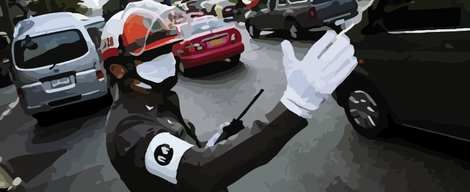
Personal experiences with police
"I have been driving in Thailand for almost 30 years and been stopped by police dozens of times for speeding or other real or imagined traffic violations. I have rarely been asked to produce a driving licence, which should be the first thing the policeman asks for. I have never been given a ticket. Whether I believed I’d broken the law or not, I have always preferred to take care of it on the spot, and the police have always been agreeable. This means the exchange of cash, usually a few hundred baht, with no receipt issued of course.
Following are some of the more memorable encounters I have had with police on the road: After getting on the expressway at Ploenchit Road, I was followed by a traffic policeman on a motorcycle. I had noticed him waiting near the toll booth, and he stopped me after I had gone about 100 meters. After I opened my window, he pushed his hand in and said: “Give me 1,000 baht.” I said I didn’t have 1,000 baht and gave him 300 baht. He took it and promptly left, going against the flow of traffic back to the toll booth to wait for a new victim.
Near that same spot a possibly intoxicated policeman on a motorcycle stopped me about 500 meters from the toll booth and claimed I had crossed traffic lanes illegally. He specifically asked for money to buy some Johnny Walker whisky. I replied that I didn’t have enough cash for the expensive imported brand, but I shelled out 500 baht just to get away from him.
On another occasion, after I had paid the toll at a Don Mueang tollway booth, an orange-helmeted policeman waiting next to the booth demanded that I show a work permit. I asked if foreigners now needed a work permit to drive a car, and showed him my Thai driving licence instead. I drove away while he stood there with a confused look on his face.
Once I was driving past Kamphaeng Phet on the Asian Highway and there were two highway police checkpoints set up about two kilometers apart. I was stopped at the first one for speeding and paid a 300 baht “fine” on the spot. I was then stopped at the second checkpoint for the same reason. I told the policeman I had already given 300 baht at the first checkpoint. He got on the radio and after a short while gave me a salute and motioned for me to proceed down the road.
Incidents like those described above are infuriating but I have come to accept them as a part of life in Thailand. Almost all Thai drivers can recount similar tales and, except for a couple of instances, I haven’t felt that being a foreigner was a factor in my being stopped. I have never felt intimidated as the victim of a roadside traffic scam, only annoyed. But getting stopped and searched on the street is an entirely different matter.
I was once searched while hiring a motorcycle taxi in Sukhumvit Soi 16 (Thonglor police district). The policeman who searched me was decidedly unfriendly, and as he ordered me to take everything out of my pockets and open my bag the thought crossed my mind that I was at the mercy of this surly man’s whims. Throughout the incident the policeman ignored the taxi rider. He wasn’t searched nor was his motorcycle.
One long-term resident told The BigChilli that he had been stopped and searched three times in the Sukhumvit/Asoke area in recent years – twice at night while travelling in a taxi with his girlfriend and once on a Sunday morning in front of the stairs accessing the BTS skywalk which spans the intersection. On each occasion he was lightly frisked and his belongings were inspected before he was let go. The man said the police never asked for money, and this is in line with other accounts.
After talking to him and other victims of random searches I decided to ‘stake out’ the area around the Sukhumvit/Asoke intersection over a period of several weeks last year. While standing – sometimes for a few hours – on the BTS walkway above the intersection, I saw many searches of foreigners conducted by the police.
Along with many other foreigners I am relieved that this practice has apparently been stopped, but I still feel a lingering apprehension when I see a policeman approaching me on the footpath.”
"I have been driving in Thailand for almost 30 years and been stopped by police dozens of times for speeding or other real or imagined traffic violations. I have rarely been asked to produce a driving licence, which should be the first thing the policeman asks for. I have never been given a ticket. Whether I believed I’d broken the law or not, I have always preferred to take care of it on the spot, and the police have always been agreeable. This means the exchange of cash, usually a few hundred baht, with no receipt issued of course.
Following are some of the more memorable encounters I have had with police on the road: After getting on the expressway at Ploenchit Road, I was followed by a traffic policeman on a motorcycle. I had noticed him waiting near the toll booth, and he stopped me after I had gone about 100 meters. After I opened my window, he pushed his hand in and said: “Give me 1,000 baht.” I said I didn’t have 1,000 baht and gave him 300 baht. He took it and promptly left, going against the flow of traffic back to the toll booth to wait for a new victim.
Near that same spot a possibly intoxicated policeman on a motorcycle stopped me about 500 meters from the toll booth and claimed I had crossed traffic lanes illegally. He specifically asked for money to buy some Johnny Walker whisky. I replied that I didn’t have enough cash for the expensive imported brand, but I shelled out 500 baht just to get away from him.
On another occasion, after I had paid the toll at a Don Mueang tollway booth, an orange-helmeted policeman waiting next to the booth demanded that I show a work permit. I asked if foreigners now needed a work permit to drive a car, and showed him my Thai driving licence instead. I drove away while he stood there with a confused look on his face.
Once I was driving past Kamphaeng Phet on the Asian Highway and there were two highway police checkpoints set up about two kilometers apart. I was stopped at the first one for speeding and paid a 300 baht “fine” on the spot. I was then stopped at the second checkpoint for the same reason. I told the policeman I had already given 300 baht at the first checkpoint. He got on the radio and after a short while gave me a salute and motioned for me to proceed down the road.
Incidents like those described above are infuriating but I have come to accept them as a part of life in Thailand. Almost all Thai drivers can recount similar tales and, except for a couple of instances, I haven’t felt that being a foreigner was a factor in my being stopped. I have never felt intimidated as the victim of a roadside traffic scam, only annoyed. But getting stopped and searched on the street is an entirely different matter.
I was once searched while hiring a motorcycle taxi in Sukhumvit Soi 16 (Thonglor police district). The policeman who searched me was decidedly unfriendly, and as he ordered me to take everything out of my pockets and open my bag the thought crossed my mind that I was at the mercy of this surly man’s whims. Throughout the incident the policeman ignored the taxi rider. He wasn’t searched nor was his motorcycle.
One long-term resident told The BigChilli that he had been stopped and searched three times in the Sukhumvit/Asoke area in recent years – twice at night while travelling in a taxi with his girlfriend and once on a Sunday morning in front of the stairs accessing the BTS skywalk which spans the intersection. On each occasion he was lightly frisked and his belongings were inspected before he was let go. The man said the police never asked for money, and this is in line with other accounts.
After talking to him and other victims of random searches I decided to ‘stake out’ the area around the Sukhumvit/Asoke intersection over a period of several weeks last year. While standing – sometimes for a few hours – on the BTS walkway above the intersection, I saw many searches of foreigners conducted by the police.
Along with many other foreigners I am relieved that this practice has apparently been stopped, but I still feel a lingering apprehension when I see a policeman approaching me on the footpath.”
Advice to foreigners
LEAVE aside the laws, the embassy statements and lawyers who are not present when you are dealing with the police or BMA inspectors. These officials have power over you and frankly, they can do what they want. It is always scary situation to be approached by the authorities in a foreign country. The best way to act when stopped by the police – whether guilty of something or not – is to be polite and cooperative.
Some specific advice to foreigners in Thailand:
• Carry a copy of the first page and entry stamp page of your passport. Ideally, you should carry the original passport, but many foreigners hesitate to do this because if it is stolen or lost, getting a replacement can be a major hassle.
• If you are taken to the police station, insist on calling a lawyer or your embassy. Don’t sign any documents and don’t try to bribe the police because you could go to jail for that.
• Don’t argue with the police, keep cool. It is always helpful to contact a Thai friend or acquaintance and let them talk to the police.
LEAVE aside the laws, the embassy statements and lawyers who are not present when you are dealing with the police or BMA inspectors. These officials have power over you and frankly, they can do what they want. It is always scary situation to be approached by the authorities in a foreign country. The best way to act when stopped by the police – whether guilty of something or not – is to be polite and cooperative.
Some specific advice to foreigners in Thailand:
• Carry a copy of the first page and entry stamp page of your passport. Ideally, you should carry the original passport, but many foreigners hesitate to do this because if it is stolen or lost, getting a replacement can be a major hassle.
• If you are taken to the police station, insist on calling a lawyer or your embassy. Don’t sign any documents and don’t try to bribe the police because you could go to jail for that.
• Don’t argue with the police, keep cool. It is always helpful to contact a Thai friend or acquaintance and let them talk to the police.


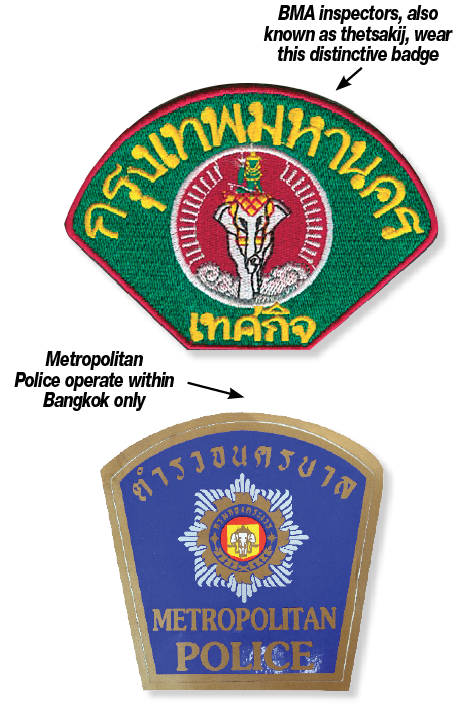

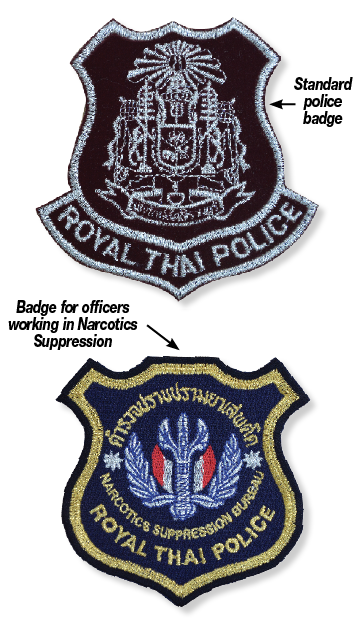
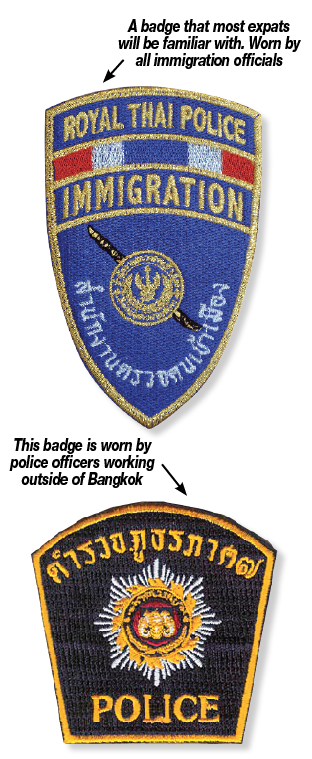

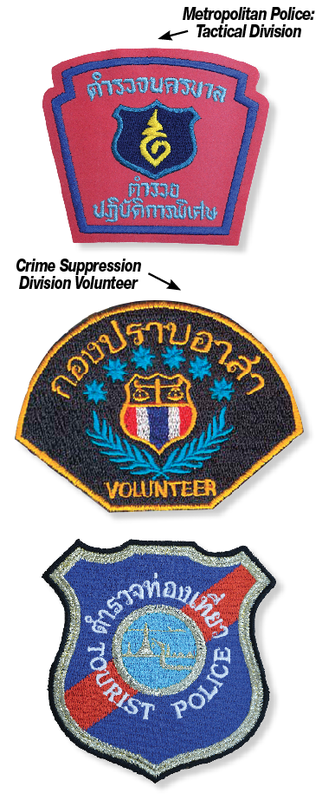
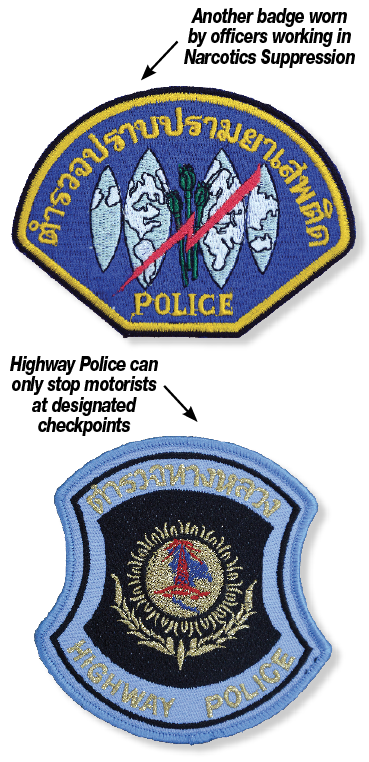
 RSS Feed
RSS Feed
















